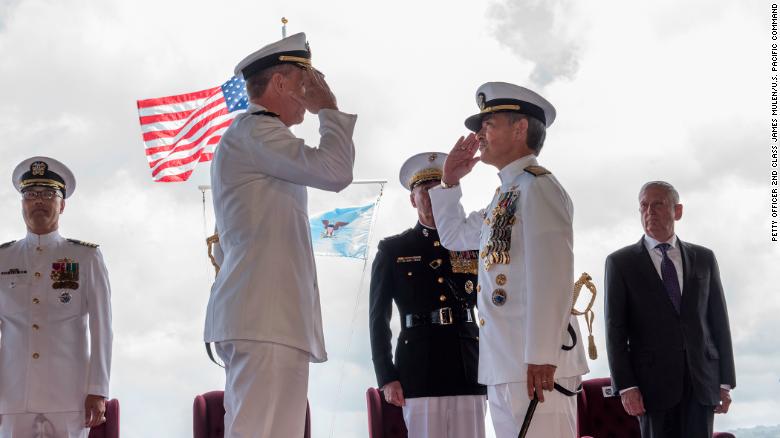The US admiral expected to become the country’s next ambassador to South Korea says North Korea remains the most imminent threat to peace in the Pacific but China’s “dream of hegemony” is Washington’s biggest long-term challenge.
Adm. Harry Harris spoke Wednesday as he turned over the reins of the US Pacific Command to Adm. Phil Davidson at Pearl Harbor, Hawaii, in a ceremony that also announced the rebranding of US military assets in the region to the US Indo-Pacific Command.
Harris, who has been at the helm of the most expansive US military command for three years, hammered home points he’s made repeatedly during his term.

“North Korea remains our most imminent threat and a nuclear-capable North Korea with missiles that can reach the United States is unacceptable,” he said.
However he added, “China remains our biggest long-term challenge. Without focused involvement and engagement by the United States and our allies and partners China will realize its dream of hegemony in Asia.”
It is unclear what role Harris will play in talks with North Korea leading up to a hoped-for summit between US President Donald Trump and North Korea leader Kim Jong Un in Singapore on June 12. Harris’ nomination went to the Senate on May 18 ahead of his expected confirmation.
The admiral had been Trump’s choice for to fill the vacant ambassador post in Australia, but that nomination was pulled hours before his confirmation hearing in April. Sources told CNN at the time that the move was the idea of Secretary of State Mike Pompeo, who has been instrumental in laying the groundwork for a Trump-Kim summit.
While Harris has always been a hawk on North Korea during his term at Pacific Command, he has also issued warnings on China as Beijing has pursued a more muscular military posture in the Pacific and established a military presence on man-made islands in areas the US and its allies contend are international waters.
Harris was still in charge of Pacific Command last week when it pulled an invitation for China to participate in the 2018 Rim of the Pacific (RIMPAC) military exercise, the world’s largest international maritime warfare exercise.
US officials said that decision was made after Beijing’s recent deployment of missile systems and the first landing of a Chinese bomber on an island in the South China Sea.
Standing alongside Secretary of State Mike Pompeo at a news conference in Washington on May 23, Chinese Foreign Minister Wang Yi called the US decision “unhelpful.”
“We find that a very unconstructive move … It’s unhelpful to mutual understanding between China and the US. We hope the US will change such a negative mindset,” he said.
In Hawaii Wednesday, Mattis said, “we should cooperate with Beijing where we can but stand ready to confront them where we must.”
The admiral and future ambassador also warned his successors to keep an eye on Moscow, saying Russia is trying to act as “the spoiler” in the Indo-Pacific.
“A geopolitical competition between free and repressive visions of world order is taking place in the Indo-Pacific,” Harris said.
“Great power competition is back and I believe we’re approaching an inflection point in history…. Freedom and justice hang in the balance.”
As reported by CNN
